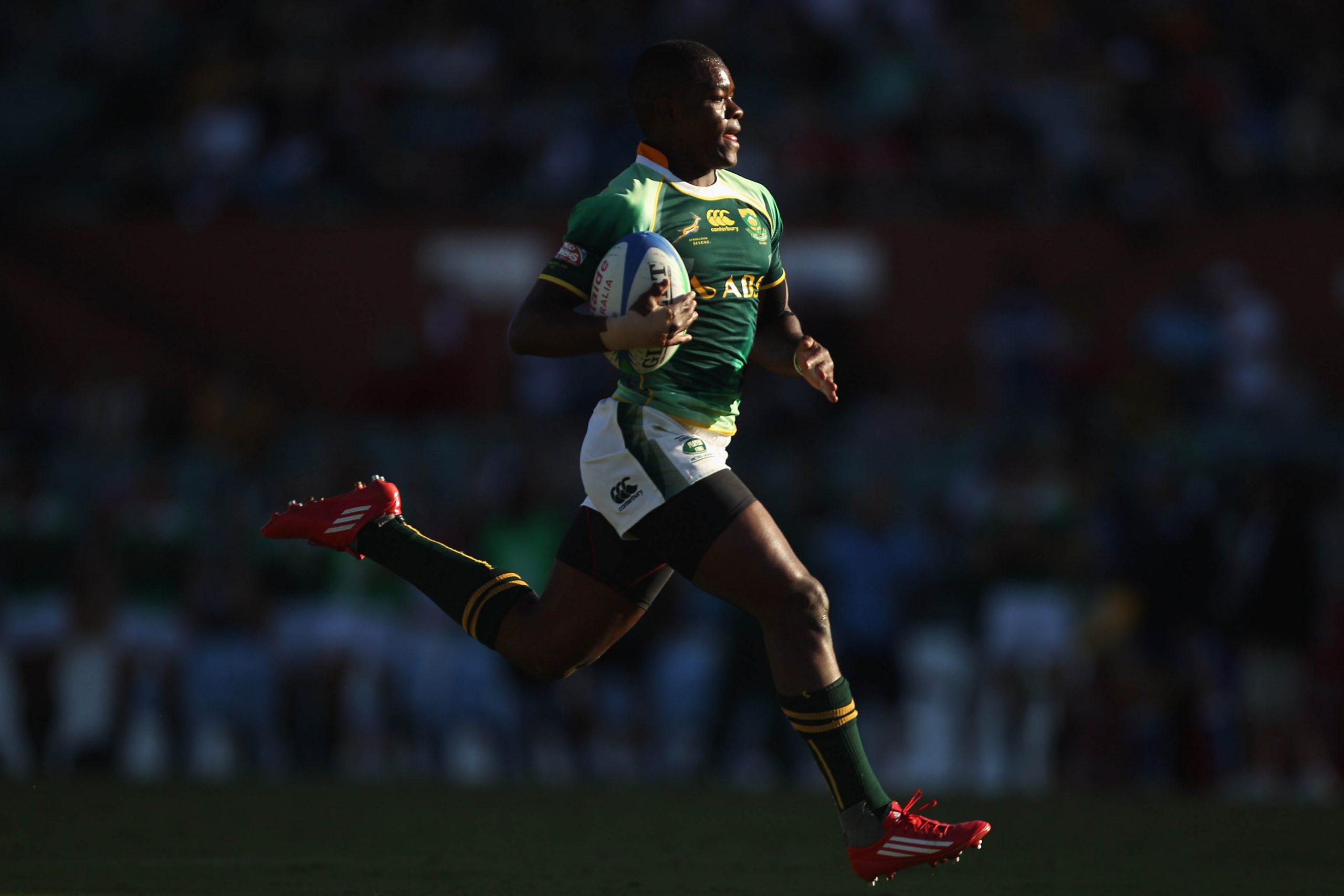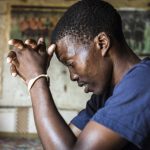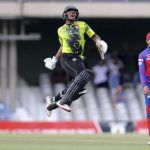Tshotsho Mbovane, rugby player denied
Winger Tshotsho Mbovane opens up about the battles he had to fight on the streets of Langa and on rugby fields across the country and the world.
Author:
13 April 2019

Whoever put a knife through Tshotsho Mbovane – on two separate occasions – in the months before he played the most memorable rugby game of his career must have hated him.
They must have hated seeing Mbovane on the wing, donning the famous Paul Roos Gymnasium colours and then getting his Junior Springbok blazer, winning a World Cup and gaining Springbok Sevens colours all before he turned 21.
They hated him. They hated the fact that Mbovane was about to rescue his family from the Langa township strife he endured while growing up in Cape Town, and hated that the occasional long-distance trip to his rural home in KuGatyana (Willowvale) would turn into pleasant, memorable tapestry.
Related article:
Despite his diminutive stature, Mbovane was one of rugby’s most promising backline sensations. He was destined for at least a stellar Sevens career, if not a Super Rugby push.
The Western Province traditions under which Mbovane grew up had long advocated for the smaller guy. Breyton Paulse, Gio Aplon, Juan de Jongh and Cheslin Kolbe all achieved hero status in blue and white.
But Mbovane faced the twin obstacles of wrestling a life in the township that kept tugging at his career, attempting to draw it back, and the exacting pursuit of a place in rugby’s archaic ecosystem.
And so, the people who stabbed him while he was nursing a knee injury, months before the IRB Under-20 World Cup in Cape Town in 2012, were fuelled by nothing but hate and envy.
Two stabbings
Fortunately, Dawie Theron soothed some of his wounds, but not all. The Baby Boks coach at the time told Mbovane that, if fit, he would make the squad. The thugs, who went after him (twice), all because of a girl he was dating, left Mbovane with mental scars that he is still trying to heal.
“They stabbed me on my left arm and under my shoulder,” Mbovane recalls. “I was still recovering from a knee injury I sustained when I played in an Under-21 Currie Cup semifinal against the Sharks in Cape Town.
Related article:
“I was walking using crutches, so I couldn’t run or fight or anything. I had to try to recover in time to make the Under-20 World Cup. We were given some time off from training. I came home, after being dropped off by the Baby Boks physiotherapist, and I got stabbed a second time about a month before the World Cup.
“I had gone to my friends to say howzit and I saw the same group of guys from the first stabbing. A melee broke out, from nowhere, and I ended up getting stabbed again.
“That meant I had to recover from fresh wounds and the knee operation, which I’d been battling all along.”
Letting go
By the time of the second stabbing, Mbovane had severed ties with the girl but the thugs didn’t care. She greeted him and whispered something vague. It was enough to fuel another wave of rage.
“The stabbing was something I never thought would happen to me. I could say it left me traumatised,” he says. “I grew up in the township and these things used to happen right in front of us when we were growing up. But you never quite believe it could happen to you because I didn’t grow up as a stout [naughty] child. I was a respectful child.
“And if I didn’t have a good heart, I would have held a grudge against those people and probably sought revenge. I still see the people that stabbed me. But I let go of the anger and bad blood a long time ago. I decided to focus on my future and put those incidents behind me.
“If I didn’t do that, I probably wouldn’t have gone as far as I did. I probably would have wanted to get into fights and end up in the cemetery or killing someone else because of the anger.”
Youtube sensation
The Tshotsho Mbovane rugby fans saw pirouetting on the field belied the chaos that happened in his life off it. He sprang into view as a YouTube sensation, becoming one of the first schoolboy players to have his own video compilation.
As the Paul Roos Gymnasium first XV outside centre, sometimes wing, Mbovane tangoed with his opponents and left them sprawled on a slippery dance floor. He was a black, township boy brought into rugby’s elite schooling system and given the machinery to succeed – a good news story. Hope coursed through his veins.
“I was the first one in my family to make a career out of rugby, to even play the sport,” says Mbovane. “I am born and bred in Langa, but our original home is in Willowvale, KuGatyane, in the former Transkei.
“Rugby is not a commonly played sport that side of the world, but fortunately I picked the game up at Zimasa Community [Primary] School here in Langa.”
He arrived at Paul Roos on the back of promising Western Province Under-12 and Under-13 performances. That he got provincial colours while playing at a township school, in a province rich with rugby privilege, spoke volumes of his talent.
Happy days
Although there were challenges adjusting from a township school to an Afrikaans-medium school, he thrived and remembers his high school days with giddy fondness.
“I had the time of my life at Paul Roos,” he says. “When I got there I felt at home, even though I was miles away from home. People were speaking Afrikaans around me and I didn’t understand a word, but I had a coach [Dawie Snyman] that took to me like I was his son.
“He made sure that I got everything I needed and I performed very well at school because I had someone that looked after me. He taught me pretty much everything about the game. He made me realise that you never stop working as a player, no matter how talented you are.
Related article:
“When I got there, I could side-step and all, but he taught me more things about my all-round game. He would show me All Blacks videos, showing me moves and how to do this and that.
“I was at the right place at the right time, and that is how I managed to reach the levels I did in rugby.”
Living a double life
In some ways, Mbovane was living a double life. The catcalls from the township, reminding him from where he came, would ring loud when it was time to go home.
There were difficulties, of course.
“They took care of all the financial costs involved with the studies. And if we had a weekend out, they would give you something [a stipend] for you to take home for the weekend. I shared the money with my mother because I was young and didn’t really know what to do with it.
“Sometimes [well-off] parents who knew the situation of some of the kids like me would slip me some money around the corner. You play with their children and the team is doing well, and I guess they felt some sort of sympathy and they gave me money and said, ‘Don’t tell anyone, but take this.’”
Related article:
His career graph shot up faster than a fuel price hike. There wasn’t a provincial or junior national level Mbovane didn’t represent, from Under-13 Craven Week to the Under-16 Grant Khomo Week, then Craven Week and eventually SA Schools. Mbovane followed the linear rugby path to stardom, step by step.
When his schooling ended, so too did his sheltered Stellenbosch existence. But there were still some high notes to be hit before the dramatic fall.
Straight out of high school, he made the South African Sevens team and toured the globe with Paul Treu’s charges, learning both the dark arts of the Sevens trade and how to punch above his weight once he returned to the 15-man game.
Stabbing anxiety
The 2011 stabbing was a shocking jolt to the senses. It left him with cloying anxiety that trouble was always just around the corner.
But at the time he had enough talent that Theron included him in his 2012 Baby Boks plans. And as a result Mbovane tasted, for the last time, what it would be like to share a dressing room with future Springboks Jan Serfontein, Pieter-Steph du Toit, Raymond Rhule, Dillyn Leyds and Steven Kitshoff when they beat New Zealand’s Baby Blacks in the Under-20 World Cup final at Newlands.
Mbovane booted the final kick into touch as South Africa celebrated a somewhat 1995 moment against the old foe. They left future All Blacks Ofa Tu’ungafasi and Nathan Harris distraught on the Newlands turf.
Blitzboks vs Western Province
His apex was short-lived. A tug-of-war for his services between the Blitzboks and Western Province left him with the stink of an unwanted, unloved man.
“Province wanted me to sign for them but Paul Treu also wanted me to extend the two-year contract I had with the Sevens,” Mbovane says. “I wasn’t happy with the WP offer and I was fighting them on the terms. The day I signed for the Blitzboks, they came to me with the right offer.
“All this time, I’d waited for them to improve their offer and they had delayed. So I went with the Sevens team and everything was going well after Treu signed me. But in 2013, Treu had to leave and I was left in limbo. The coach that had signed me had just left and things started going wrong.
Related article:
“Around June or July 2014, I was released [by South African Sevens] to go and play for Boland. Soon after, my agent took me to the Leopards to get some game time and while I was with the Leopards, Western Province said I could come back to Cape Town.
“I hadn’t signed with any provincial union because I was still contracted to the Sevens and was getting paid by the Sevens. And with things not going well at Boland and Leopards, I decided to head back to Cape Town.
Responsibilities
“In the midst of it all, I had my first child [of two], which added to the pressure of it all. It became tough to juggle the pressure of getting my career back on track, maintain my newborn and support my family at the same time.
“My mother was completely dependent on me and I had to provide everything for the family.”
Although he featured prominently for Province on his return “home” for the Vodacom Cup campaign, his star had waned badly.
“The wings I played with in the team played Super Rugby, but I didn’t get that opportunity. But my mind was on getting a contract with Western Province, since I had featured prominently in the Vodacom Cup campaign. But I didn’t get anything.
“The following year, I only had a Vodacom Cup contract again and, other than that, I was sitting idly at home.
“My agent was running around looking for something, but what made it difficult was the fact that I sustained an injury to my right knee, which needed surgery. No one wanted to take on an injured player and so I landed back here in Langa, where I started coaching some kids to pass the time.”
Returning to the streets that almost took his life
Mbovane landed headfirst back on the streets where he was twice a victim of a violent crime. That he gives back to the community by coaching Zimasa’s budding boys and girls and plays club rugby for Langa is hugely commendable.
It’s scarcely believable that, at 27 years old, he is living off a pittance the school pays him in “thanks” for his contribution. But it’s nothing anyone can live off, Mbovane admits. Sometimes he has to call his retired 70-year-old mother, Nolesson, who lives off a government grant, to ask for money – which is why he still harbours dreams of returning to the sport even though he knows it will be hard.
South African Rugby Players’ Association president and Lions captain Warren Whiteley says the lack of mentors in rugby for players like Mbovane needs addressing urgently.
Related article:
“It happens often, hey, especially to guys like Tshotsho,” says Whiteley, who was roommates with Mbovane in the Blitzbokke team.
“We need to get mentorship for the players in for these young guys.
“To get thrust into this world at such a young age … I mean Tshotsho was supporting his family at the age of 19 or 20. How do you handle that? It’s hectic for these youngsters. He’s not alone, it’s an ongoing trend in South Africa.
“Tshotsho has had to face a lot more challenges than privileged South Africans. It’s just a fact.”






